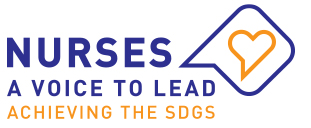Nurse's Role
Nurses respond to the health needs of people in all settings and throughout the lifespan. Their roles are critical in achieving global mandates such as universal health coverage and the Sustainable Development Goals.
– Dr Margaret Chan, Director General, World Health Organization
Why should nurses care about the SDGs?
- Nurses care for others – nurses go into the profession to improve the health of individuals and populations
- It is the right thing to do – the underlying dynamic is one of human rights and social justice
- Change is possible – over the last 15 years, there have been enormous strides in reducing extreme poverty, improving access to education and improved water and sanitation.
- It is our health – these goals affect the health of our communities, families and our own.
Nursing historical links to the SDH
Nursing has a strong tradition of studying the determinants of health.
- In her famous writing ‘Notes on Nursing,’ Florence Nightingale detailed her understanding of health and the full range of what determines it. She interconnected personal factors such as hygiene and nutrition, with social forces such as rituals with friends visiting the sick, and economic considerations including the influence of social class on housing and health, and environmental concerns comprising the cleanliness of everything from bedding to walls and beyond. Nightingale’s perspective is very much of her time while being remarkably relevant for our time. (Nightingale, F. Notes on Nursing: What it is, and What it is not. 1860; Available from: http://digital.library.upenn.edu/women/nightingale/nursing/nursing.html)
- Ethel Bedford Fenwick was a passionate advocate for organisation and unification of nurses. As one of the founders of ICN, she believed that nurses as individuals and as a collective could make the ‘utmost difference’ to the sick. With the support of education, she called for nurses to be more than ‘instruments for the relief of suffering,’ but also the ‘harbinger of its prevention.’ Her passion in inspiring and unifying nurses was that the work of the nurses belonged outside of the boundaries of the hospital walls and had influences to the wellness of countries and the world. (Bridges, D.C., A history of the International Council of Nurses, 1899-1964: The first sixty-five years. 1967: Lippincott)
- Virginia Henderson’s fundamental conviction was that the function of the nurse is to help the patient. She was one of the early pioneers of person-centred care that considers a holistic approach to care. Her ideas were further articulated in the ‘Principles of Practice’. (Henderson, V., Harmer and Henderson’s Textbook of the Principles and Practice of Nursing. 1955, Macmillan: New York)
The social determinants and their impact on health is not a new concept for nursing. In fact, it is at the very core of the profession. Nursing has a mandate to be an ambassador and leader in this field. It extends far beyond goals related to health only, and includes those determinants that have an impact on health and wellbeing.
As nurses, we know that health involves more than the delivery of health services and that the social, economic and political causes of the problems we see must also be addressed. War and unrest, economic uncertainties, income disparities and the widening gap between the rich and the poor thwart people’s life opportunities and profoundly influence health and well-being . Nurses in clinical practice are uniquely positioned to bear witness to these realities; but we have yet to fully realise our power to bring about change by speaking about the human suffering we see. (Kagan, P.N., M.C. Smith, and P.L. Chinn, eds. Philosophies and practices of emancipatory nursing: Social justice as praxis. Routledge studies in health and social welfare. 2014, Routledge: New York).
The SDGs are a roadmap that lay out the vision for a healthy, peaceful and prosperous world. But they can only be achieved if things are done different and as nurses we have an especially important part to play.
Our voice is the voice of the individuals, families, groups and communities with whom we work. Our voice is the voice of more than 20 million nurses around the globe. It is a voice to lead in the transformation of our world.

